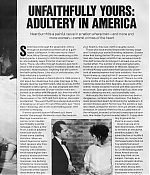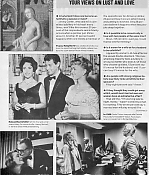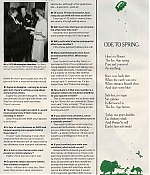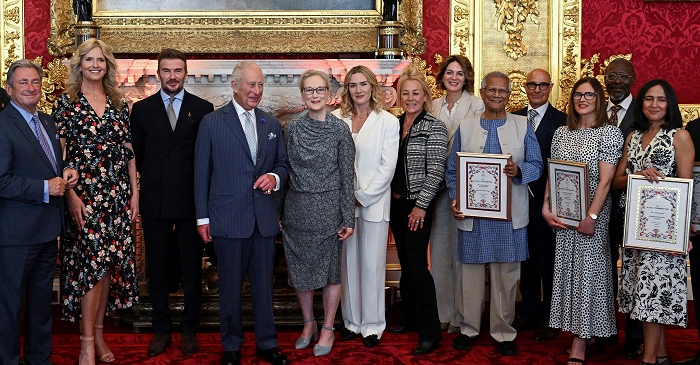|
Simply Streep is your premiere online resource on Meryl Streep's work on film, television and in the theatre - a career that has won her acclaim to be one of the world's greatest living actresses. Created in 1999, Simply Streep has built an extensive collection over the past 25 years to discover Miss Streep's body of work through thousands of photographs, articles and video clips. Enjoy your stay and check back soon.
|
|
Unfaithfully Yours
People Magaznie ·
August 18, 1986
| ||
|
Tags
|
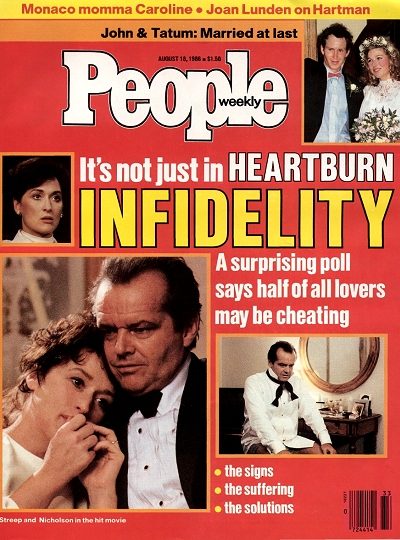
Heartburn is based on Nora Ephron’s 1983 roman à clef about her disastrous four-year marriage to Watergate reporter Carl Bernstein, who co-wrote All the President’s Men. Ephron, 38, was pregnant with their second child when the 35-year-old Bernstein embarked on an affair with Margaret Jay, then the wife of Peter Jay, the British ambassador to Washington. On the occasion of his 1979 split from Ephron, Bernstein proclaimed: “Nora and I both have always had a policy of keeping our private life out of the public eye.” Nora wasn’t listening; she wrote a best-selling book, then sold the screenplay. If every spurned spouse followed suit, there wouldn’t be enough libraries to stock the memoirs. Marriage counselors as well as recent studies say infidelity is on the rampage. In fact, a new PEOPLE poll on adultery American-style discloses some startling statistics. When we asked divorced or separated spouses why they left their mates, the majority cited infidelity, which rated higher than physical abuse and even lousy sex. Americans, moreover, are defining infidelity far more broadly than Webster’s. Nearly 70 percent of the respondents believe that you don’t actually have to commit a sexual act to be unfaithful; lusting in your heart is, they say, itself a naughty notion. Those who have moved beyond the fantasy stage aren’t simply your storied traveling salesmen. Studies show that during the last 30 years, the percentage of men who have been unfaithful has remained steady: One-half to two-thirds indulged in at least one extramarital affair. The number of philandering females, however, is on the increase. In 1953 sex researcher Alfred Kinsey concluded that 6 percent to 26 percent of married women had been unfaithful. Now the figure is way up, ranging from 21 percent to 54 percent.
Who’s been sleeping in your bed? There is no composite profile of the perfect cheater. But according to California detective Milo Speriglio, 65 percent of his clients’ mates became involved with their secret lovers at work. Speriglio also claims that if you think your mate is sleeping around, you’re probably right. Historically this kind of funny business has been a dangerous – at times fatal – business. The Babylonians prescribed death by drowning for adulterers. In ancient Greece and in Roman law, the sentence was also death, at least for women; men got off with a light sentence. In colonial America the accused were either whipped, branded, or forced to wear special symbols, like Hester Prynne’s scarlet letter A. Today adultery is grounds for divorce in every state. Even in an era of no-fault divorce laws, infidelity remains an emotional, sensitive subject. We asked the firm of Audits & Surveys, Inc. to interview 750 households to find out how adults feel about love, marriage and infidelity. On the following pages these Americans say what they think on the subject. Perhaps, as is usual in domestic dramas, it is father who knows best. When Streep tells her dad about Nicholson’s trespasses in Heartburn, she gets a succinct reply: “You want monogamy, marry a swan.”
Your Views on Lust and Love
At what point does one become unfaithful to a spouse or mate? Jimmy Carter, who said he’d committed adultery in his heart many times, won’t like this answer: 21 percent of the respondents said infidelity occurs when a partner just thinks about it. Another 21 percent said it happens when one meets a member of the opposite sex for dinner or drinks; 24 percent say it occurs when kissing and petting is involved. Only 26 percent believe it happens when two people sleep together.
Is it possible to be romantically in love with two people at the same time? Most – 58 percent – said yes. Could that be wishful thinking?
Is it worse for a wife or for a husband to be unfaithful? Apparently women’s lib has affected the sexual double standard. The overwhelming majority feels adultery is wrong no matter who does it. Of those who choose up sides, 12 percent say it’s worse for the husband, and 11 percent say it’s worse for the wife.
Are people with strong religious beliefs less likely to be unfaithful to their spouses? Fifty-eight percent said “Amen.”
If they thought they could get away with it, would most married men and women have an extramarital affair? That old line, “I’m working late tonight, Honey,” wasn’t coined by a man for nothing. Fifty-seven percent say a married man will play around if he thinks he won’t get caught, but only 36 percent think a married woman would.
Agree or disagree – as long as no one gets hurt, there’s nothing wrong about extramarital affairs. Eighty-six percent disagree. Twelve percent said it’s all right with them, but they’ve obviously seen too many French movies.
Though they might not admit it, would most people know if their mate was cheating on them? Sixty-five percent think your spouse is on to you.
Is fear of such diseases as AIDS and herpes keeping more people faithful these days? It wasn’t just changing morals that helped defeat the sexual revolution. Seventy-three percent of respondents say diseases have stopped dalliances.
Is it lust or love that prompts most people to commit adultery? Eighty-three percent call it lust.
Do parents tend to be more faithful than childless couples? Most – 55 percent – say yes. Obviously they haven’t seen Heartburn.
Of every 10 married men, how many do you think will have an affair? On average, five out of 10. Nobody said none, although a few jaded people – 3 percent – said all.
Of every 10 married women, how many do you think will have an affair? Four out of 10, which means there are nearly enough willing wives.
Will most men who have an extramarital affair have only one? Seventy-four percent think that once a man strays, he’ll do it again.
Will a wife who’s had an extramarital affair have another? Fifty-three percent believe she will.
Many married people never have an extramarital affair. What stops them? Don’t expect profundity. Most respondents think it’s a combination of being happily married and taking marriage vows seriously, 14 percent say it’s a matter of money (the faithful can’t afford it), 13 percent say it’s because such people are not attractive enough and 11 percent say it’s because they don’t have the energy.
How likely is it that you could be in a situation where you would be unfaithful to your spouse or mate? This is the question we’ve been waiting for: Turns out, an admirable 72 percent said “Very unlikely.” That poses another question: Who’s doing all the fooling around?
If you were to be unfaithful, which characteristic would most attract you to a romantic partner? The majority (33 percent) voted for sexual attractiveness, followed by – are you listening, Rodney Dangerfield? – a sense of humor (19 percent); wealth and intelligence tied at 15 percent.
If you found out your mate was unfaithful, what would you do? Respondents showed great civility in this matter. An impressive 73 percent said they would confront the guilty party and try to discuss the matter reasonably; 20 percent said they would terminate the marriage as quickly as possible; 5 percent said they would ignore the affair and hope it would end; 2 percent said they didn’t know what they would do. Nobody at all voted for wreaking revenge by writing a novel.


Posted on September 16th, 2025
|
Posted on September 9th, 2025
|
Posted on August 12th, 2025
|
Posted on June 13th, 2025
|
Posted on May 18th, 2025
|




